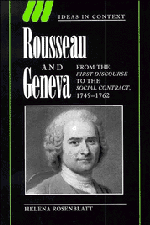Book contents
- Frontmatter
- Contents
- Acknowledgments
- Note on translation
- List of abbreviations
- Introduction. Rousseau in a Genevan context
- 1 The formation of a “citizen of Geneva”
- 2 Rousseau becomes Rousseau, 1751–1754. Geneva, doux commerce, and Rousseau from the First to the Second Discourse
- 3 Rousseau and natural law: the context
- 4 Rousseau and natural law: the Second Discourse
- 5 The “invisible chain”: Rousseau and Geneva from the Second Discourse to the Social Contract
- 6 The Social Contract
- Epilogue
- Select bibliography
- Index
- IDEAS IN CONTEXT
Epilogue
Published online by Cambridge University Press: 28 October 2009
- Frontmatter
- Contents
- Acknowledgments
- Note on translation
- List of abbreviations
- Introduction. Rousseau in a Genevan context
- 1 The formation of a “citizen of Geneva”
- 2 Rousseau becomes Rousseau, 1751–1754. Geneva, doux commerce, and Rousseau from the First to the Second Discourse
- 3 Rousseau and natural law: the context
- 4 Rousseau and natural law: the Second Discourse
- 5 The “invisible chain”: Rousseau and Geneva from the Second Discourse to the Social Contract
- 6 The Social Contract
- Epilogue
- Select bibliography
- Index
- IDEAS IN CONTEXT
Summary
Rousseau repeatedly expressed his desire to be useful to his country. In a letter to his friend Isaac-Ami Marcet de Mézières, Rousseau clarified what he meant by being useful: he meant assisting in the “reestablishment of the liberty and the rights of the bourgeoisie.”
That helping the Genevan bourgeoisie regain their rights was Rousseau's purpose in the Social Contract was evident, at the time, both to the Genevan bourgeoisie and to their patrician government. It was clear to all that the book furnished a philosophical basis for the bourgeoisie's political demands. “O friend, how dear you are to your fellow-citizens,” wrote Moultou enthusiastically, “this Social Contract is the arsenal of liberty, and while a small number is violently incensed, the multitude is triumphant.” Other Genevans thanked Rousseau “for the present you have given us … It is an arsenal of the most excellent weapons.” Moultou immediately reported that the Social Contract “is avidly read.” He added:
even your enemies are forced to admit that of all your books it is the one in which your genius is displayed with most vigor. What force! What depth! How superior you are even to Montesquieu! Your work must frighten all tyrants, born and unborn. It makes liberty ferment in all hearts.
Deluc expressed his deep gratitude for “the admirable things your extraordinary intelligence in political right and your virtue have made you write with such courage, to compel us to wisely maintain our fortunate constitution.”
- Type
- Chapter
- Information
- Rousseau and GenevaFrom the First Discourse to The Social Contract, 1749–1762, pp. 269 - 280Publisher: Cambridge University PressPrint publication year: 1997



